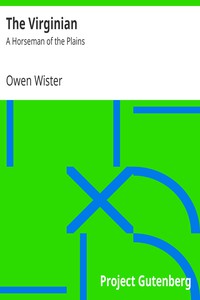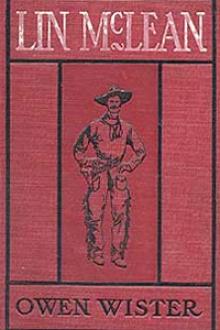The Virginian: A Horseman of the Plains, Owen Wister [best e books to read txt] 📗

- Author: Owen Wister
Book online «The Virginian: A Horseman of the Plains, Owen Wister [best e books to read txt] 📗». Author Owen Wister
Somewhere far in the basin there was a faint sound, and we stood still.
“Hush!” he said.
But it was like our watching the dawn; nothing more followed.
“They have shot that bear,” I remarked.
He did not answer, and we put the saddles on without talk. We made no haste, but we were not over half an hour, I suppose, in getting off with the packs. It was not a new thing to hear a shot where wild game was in plenty; yet as we rode that shot sounded already in my mind different from others. Perhaps I should not believe this to-day but for what I look back to. To make camp last night we had turned off the trail, and now followed the stream down for a while, taking next a cut through the wood. In this way we came upon the tracks of our horses where they had been galloping back to the camp after their fright. They had kicked up the damp and matted pine needles very plainly all along.
“Nothing has been here but themselves, though,” said I.
“And they ain't showing signs of remembering any scare,” said the Virginian.
In a little while we emerged upon an open.
“Here's where they was grazing,” said the Virginian; and the signs were clear enough. “Here's where they must have got their scare,” he pursued. “You stay with them while I circle a little.” So I stayed; and certainly our animals were very calm at visiting this scene. When you bring a horse back to where he has recently encountered a wild animal his ears and his nostrils are apt to be wide awake.
The Virginian had stopped and was beckoning to me.
“Here's your bear,” said he, as I arrived. “Two-legged, you see. And he had a hawss of his own.” There was a stake driven down where an animal had been picketed for the night.
“Looks like Ounces,” I said, considering the footprints.
“It's Ounces. And Ounces wanted another hawss very bad, so him and Pounds could travel like gentlemen should.”
“But Pounds doesn't seem to have been with him.”
“Oh, Pounds, he was making coffee, somewheres in yonder, when this happened. Neither of them guessed there'd be other hawsses wandering here in the night, or they both would have come.” He turned back to our pack animals.
“Then you'll not hunt for this camp to make sure?”
“I prefer making sure first. We might be expected at that camp.”
He took out his rifle from beneath his leg and set it across his saddle at half-cock. I did the same; and thus cautiously we resumed our journey in a slightly different direction. “This ain't all we're going to find out,” said the Virginian. “Ounces had a good idea; but I reckon he made a bad mistake later.”
We had found out a good deal without any more, I thought. Ounces had gone to bring in their single horse, and coming upon three more in the pasture had undertaken to catch one and failed, merely driving them where he feared to follow.
“Shorty never could rope a horse alone,” I remarked.
The Virginian grinned. “Shorty? Well, Shorty sounds as well as Ounces. But that ain't the mistake I'm thinking he made.”
I knew that he would not tell me, but that was just like him. For the last twenty minutes, having something to do, he had become himself again, had come to earth from that unsafe country of the brain where beckoned a spectral Steve. Nothing was left but in his eyes that question which pain had set there; and I wondered if his friend of old, who seemed so brave and amiable, would have dealt him that hurt at the solemn end had he known what a poisoned wound it would be.
We came out on a ridge from which we could look down. “You always want to ride on high places when there's folks around whose intentions ain't been declared,” said the Virginian. And we went along our ridge for some distance. Then, suddenly he turned down and guided us almost at once to the trail. “That's it,” he said. “See.”
The track of a horse was very fresh on the trail. But it was a galloping horse now, and no bootprints were keeping up with it any more. No boots could have kept up with it. The rider was making time to-day. Yesterday that horse had been ridden up into the mountains at leisure. Who was on him? There was never to be any certain answer to that. But who was not on him? We turned back in our journey, back into the heart of that basin with the tall peaks all rising like teeth in the cloudless sun, and the snow-fields shining white.
“He was afraid of us,” said the Virginian. “He did not know how many of us had come up here. Three hawsses might mean a dozen more around.”
We followed the backward trail in among the pines, and came after a time upon their camp. And then I understood the mistake that Shorty had made. He had returned after his failure, and had told that other man of the presence of new horses. He should have kept this a secret; for haste had to be made at once, and two cannot get away quickly upon one horse. But it was poor Shorty's last blunder. He lay there by their extinct fire, with his wistful, lost-dog face upward, and his thick yellow hair unparted as it had always been. The murder had been done from behind. We closed the eyes.
“There was no natural harm in him,” said the Virginian. “But you must do a thing well in this country.”
There was not a trace, not a clew, of the other man; and we found a place where we could soon cover Shorty with earth. As we lifted him we saw the newspaper that he had been reading. He had brought it from the clump of cottonwoods where he and the other man had made a later visit than ours to be sure of the fate of their friends—or possibly in hopes of another horse. Evidently, when the party were surprised, they had been able to escape with only one. All of the newspaper was there save the leaf I had picked up—all and more, for this had pencil writing on it that was not mine, nor did I at first take it in. I thought it might be a clew, and I read it aloud. “Good-by, Jeff,” it said. “I could not have spoke to you





Comments (0)